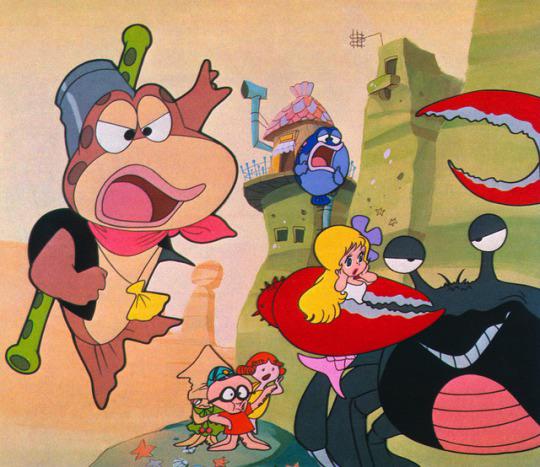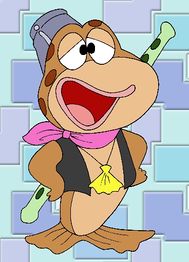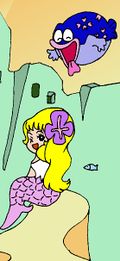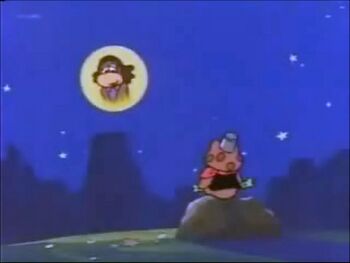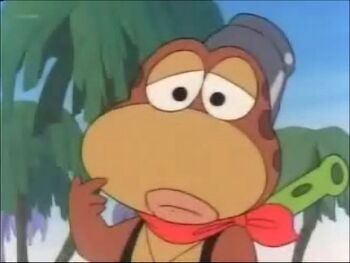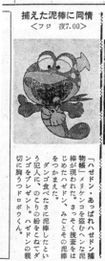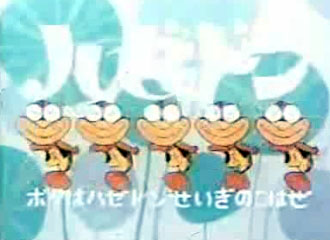Hazedon (found comedy anime series; 1972-1973)
Art from the vinyl record release of the anime's theme songs.
Status: Found
Date found: 30 Jan 2024
Found by: Anonymous
Hazedon (ハゼドン) is a comedy/adventure anime series, initially broadcast from October 5, 1972, to March 29, 1973, on Fuji Television. While the credit for "original creator", is listed as the company "Video Create", the series was the first production to be animated by anime studio Sunrise.
Story
The series is about a young goby fish named Hazedon, who's mother, before her passing, imparts that he must become "the strongest fish in Japan." Heeding her advice, he embarks on a training journey. However, along the way he meets Shiran, a mermaid, and Puyan, a pufferfish. Each episode takes a semi-episodic structure, with recurring antagonists, as well as many incidental characters. The final episode sees the payoff to many of the series ongoing plot lines, while ending on a cliffhanger.
Structure
The series has a total of 26 episodes. Each episode has a runtime of around 30 minutes, with each episode (except for the 26th episode) broken into two, 11 minute episodes. The final episode is the only exception, as it only contains one, double length story.
Cast
- Hazedon - Nobuyo Ôyama
- Puyan - Kaneta Kimotsuki
- Hazedon's mother - Akiko Takamura
- Omeguri-san - Sanji Hase
- Tamii - Reiko Katsura
- Shiran - Reiko Mutô
- Tabou - Noriko Ohara
- Icchin - Takako Sasuga
Crew
- Creators - Hajime Yagurazawa and Haruyuki Kawajima
- Writers - Toshiaki Matsushima and Hideo Kyuju
- Producer - Masao Maruyama
- Director - Makura Saki (alias for Osamu Dezaki)
- Music - Hiroshi Tsutsui
- Character design - Toshiyasu Okada
- Film editor - Tomoaki Tsurubushi
- Production managers - Osamu Hirôka and Yoshikatsu Kishimoto
- Production assistants - Nobuyuki Fukushima, Hiroshi Ôtake, Tatsuya Shibano, Yoshio Suzuki and Toshio Ueno
- Camera department - You Atsuta and Takashi Kitagawa
- Director of photography - Sumio Takahashi
- Production coordinator - Mishio Shinohara
- Sound director - Toshio Satô
- Layout artists - Shigeru Aoki, Hiroyuki Kawashima, Satoru Kusuda, Tsuguo Sakamoto, Eiki Suzuki, Minoru Tajima, Takeshi Tamazawa and Takao Yamazaki
- Clean-up checker - Hiroshi Hasegawa
- Clean-up artist - Sha Miwa
- Storyboard artists - Masakazu Higuchi, Fumio Ikeno, Akira Maeda, Yûji Nunokawa, Kaisuke Morishita, Kenji Sawamura, Kazunori Tanabashi, Yoshiyuki Tomino and Hiroshi Yashizumi
- Animators - Sanae Isshiki, Ichirô Izumi, Minoru Nakamura, Sumie Saido, Noriko Suzuki, Takao Suzuki, Yasuo Takahashi, Yumiko Takahashi, Kazue Tanaka, Katshuhiko Yamazaki
- Animation supervisor - Kazuhiko Utagawa
- Backgrounds - Studio Uni
- Background supervisor - Katsumi Handô
Availability
Home Media
The only known, official home media release of the series is a VHS tape under the label VAP, containing the first and last episode of the series, as part of VAP's "First and Final series", released in the 1990's.
The show's two theme songs, "Hazedon Ondo" and "Boku wa Hazedon" were both released on vinyl in November of 1972.
Manga/Print Media
A manga adaptation of the series, illustrated by gag manga author Itai Rentaro, was serialized in Kodansha's "TV Magazine," starting before the anime had even begun airing.[2] From November 1972 to April 1973 Kodansha's "Tanoshii Kindergarten", also ran a manga adaptation, drawn by Rentaro Itai. In addition, articles regarding the anime appeared in the November 1972 to April 1973 issues of Kodansha's "Otomodachi". Moreover, as a part of Banso's "tobidasu ehon" series of pop-up books, a tie-in pop-up book was made in 1972[3]
Online Uploads
On December 24th, 2022, YouTube user JH K uploaded episode 26 in full. The episode is of considerably lower quality than the other found episodes.
In January 2024, all 26 episodes were found on a private anime tracker and were uploaded onto Mega on the 30th.
Episodes
| # | Episode Title | Air Date | Status |
|---|---|---|---|
| 1 | Hazedon ga Yattekita! (ハゼドンがやってきた!) / Tsuyoi zo Sekaiichi (強いぞ世界一) | Oct 5th, 1972 | Found |
| 2 | Yumemiru Shīran (夢見るシーラン) / Tamii-chan no Shiawase (タミイちゃんの幸せ) | Oct 12th, 1972 | Found |
| 3 | Ten'yawan'ya no Bijin Kontesuto (てんやわんやの美人コンテスト) / Kani no Tokoya wa Ōsawagi (カニの床屋は大騒ぎ) | Oct 19th, 1972 | Found |
| 4 | Iwashi no Kosodoro-san (イワシのコソドロさん) / Min'na no Dekkai Okurimono (みんなのデッカイ贈り物) | Oct 26th, 1972 | Found |
| 5 | Tatakae Hazedon! (たたかえハゼドン!) / Mutsugorō no Puropōzu (ムツゴローのプロポーズ) | Nov 2nd, 1972 | Found |
| 6 | Hatsukoi Banzai! (初恋バンザイ!) / Ā, Mabuta no Okkasan (ああ、まぶたのおっかさん) | Nov 9th, 1972 | Found |
| 7 | Kuroi Hana o Sagase! (黒い花をさがせ!) / Shīran no Fasshonshō (シーランのファションショー) | Nov 16th, 1972 | Found |
| 8 | Hibike ka Tami no Yokobue (ひびけかたみの横笛) / Kaitō Sabaranko (怪盗サバランコ) | Nov 23rd, 1972 | Found |
| 9 | Ā! Harukanaru Seibu (ああ! はるかなる西部) / Detarame Tensai Gaka (でたらめ天才画家) | Nov 30th, 1972 | Found |
| 10 | Garakuta Angorakon (がらくたアンゴラコン) / Jinbe E-san wa Akkanbē (ジンベイさんはアッカンベー) | Dec 7th, 1972 | Found |
| 11 | Irasshaimase Obake-kun (いらっしゃいませオバケくん) / Sākasu Bōya Kyō wa! (サーカス坊や今日は!) | Dec 14th, 1972 | Found |
| 12 | Kujiragon wa Dokkoisho (クジラゴンはどっこいしょ) / Mote Mote Pendanto (もてもてペンダント) | Dec 21st, 1972 | Found |
| 13 | Yukai na Daitsuiseki (ゆかいな大追跡) / Susume! Bikkuri Basu (進め! ビックリバス) | Dec 28th, 1972 | Found |
| 14 | Otoshidama wa Hatsuyume (お年玉は初夢) / Oya Oya Janbo Hazedon (おやおやジャンボハゼドン) | Jan 4th, 1973 | Found |
| 15 | Appare Hazedon Torimono Jō (あっぱれハゼドン捕物帖) / Chakkari Hanayome-san (ちゃっかり花嫁さん) | Jan 11th, 1973 | Found |
| 16 | Hazedon wa Daisutā (ハゼドンは大スター) / Nazo no Junrei Obā-san (謎の巡礼おばあさん) | Jan 18th, 1973 | Found |
| 17 | Otoko Hazedon wa Tsurai Yo (男ハゼドンはつらいよ) Yūjōda Yo! Hazedon (友情だよ! ハゼドン) | Jan 25th, 1973 | Found |
| 18 | Abare-ra Bō Tsuihō Daisakusen (あばれら坊追放大作戦) / Ankoragon wa Daishachō" (アンコラゴンは大社長) | Feb 1st, 1973 | Found |
| 19 | Moeru Hazedon Sekaiichi (燃えるハゼドン世界一) / Kyaputentotto no Takara (キャプテントットの宝) | Feb 8th, 1973 | Found |
| 20 | Raibaru wa Hōbō Nisei (ライバルはホウボウ二世) / Kekkon wa Kowai na (結婚はこわいな) | Feb 15th, 1973 | Found |
| 21 | Hazedon wa Sekaiichi no Papa (ハゼドンは世界一のパパ) / Suzukintoki o Yattsukero! (スズキントキをやっつけろ!) | Feb 22nd, 1973 | Found |
| 22 | Saraba! Poka no Machi (さらば! ポカの町) / Hotaruika no Tenshi (ホタルイカの天使) | Mar 1st, 1973 | Found |
| 23 | Inochi no Pendanto (命のペンダント) / Hazedon Sora o Tobu (ハゼドン空をとぶ) | Mar 8th, 1973 | Found |
| 24 | Hazedon no Yokobue Kenpō (ハゼドンの横笛剣法) / Nagareboshi o Oe! (流れ星を追え!) | Mar 15th, 1973 | Found |
| 25 | Hazedon wa Meii-san (ハゼドンは名医さん) / Hazedon wa Tabiyakusha (ハゼドンは旅役者) | Mar 22nd, 1973 | Found |
| 26 | Rettsu Gō Hazedon" (レッツ・ゴー ハゼドン) | Mar 29th, 1973 | Found |
Broadcast information.
The show has been confirmed to have been broadcast on the following television stations.
- Fuji Television (The show's producer): Wednesdays, 19:00 - 19:30
- Hokkaido Cultural Broadcasting (UHB):Wednesdays, 19:00 - 19:30[4]
- Television Iwate (TVI): Tuesdays, 18:00 - 18:30[5]
- Akita Television (AKT): Wednesdays, 19:00 - 19:30[6]
- Yamagata Television System (YTS): Wednesdays, 19:00 - 19:30 (Timeshifted Channel started broadcast on October 12th)[7]
- Sendai Television (JOOX-TV): Wednesdays, 19:00 - 19:30[6]
- Fukushima Central Television (FCT): (Broadcast in a 15 minute slot, in 1982) - Saturdays, 8:00 - 8:15 (April - September 1982) - Monday - Friday 17:30 - 17:45 (January - February 1983) [8]
- UHF Television Yamanashi (UTY): (Broadcast in a 15 minute slot, in 1980): Mondays - Fridays, 16:35 - 16:50[9]
- Toyama Television (BBT): Wednesdays, 19:00 - 19:30[10]
- Ishikawa TV (ITC): Wednesdays, 19:00 - 19:30[10]
- Fukui Television Broadcasting (FTB): Wednesdays, 19:00 - 19:30[10]
Gallery
External Links
- Episodes 1-12 and 15-18 of the show. Retrieved 25 Oct '19
- Nicovideo upload of the intro and outro of the anime. Retrieved 25 Oct '19
- Write-up about the series on the Blog Kioku no Kasabuta ("Scab of memory") Retrieved 25 Oct '19
- Episode 26 on Youtube. Retrieved 23 Jan '23
- Aucfan tracking for a VHS of the series' first and last episodes Retrieved 24 Jan '31
- Discogs listing for the vinyl release of the theme songs
References
- ↑ Anime News Network Encyclopedia page about Hazedon. Retrieved 25 Oct '19
- ↑ http://zenin1965.livedoor.blog/archives/1221230.html
- ↑ https://aucview.aucfan.com/yahoo/q1120437989/
- ↑ Hokkaido Shimbun (reduced-size edition) March, 1973, Television Column.
- ↑ Kahoku Shimpō (morning edition), April 3, 1973 - September 25, 1973. Television Column.
- ↑ 6.0 6.1 Kahoku Shimpō (morning edition), October 5, 1972 - March 29, 1973. Television Column.
- ↑ Kahoku Shimpō (morning edition) October 12, 1972 - April 5, 1973. Television Column.
- ↑ Fukushima Minpou (morning edition) April 3, 1982 - September 25, January 13, 1983 - February 11, 1983. Televison Column
- ↑ Animage - "National Broadcast List" February 1980 issue, Tokuma Shoten, p. 116.
- ↑ 10.0 10.1 10.2 The Hokkoku Shimbun (morning edition), October 5, 1972. Television Column.
